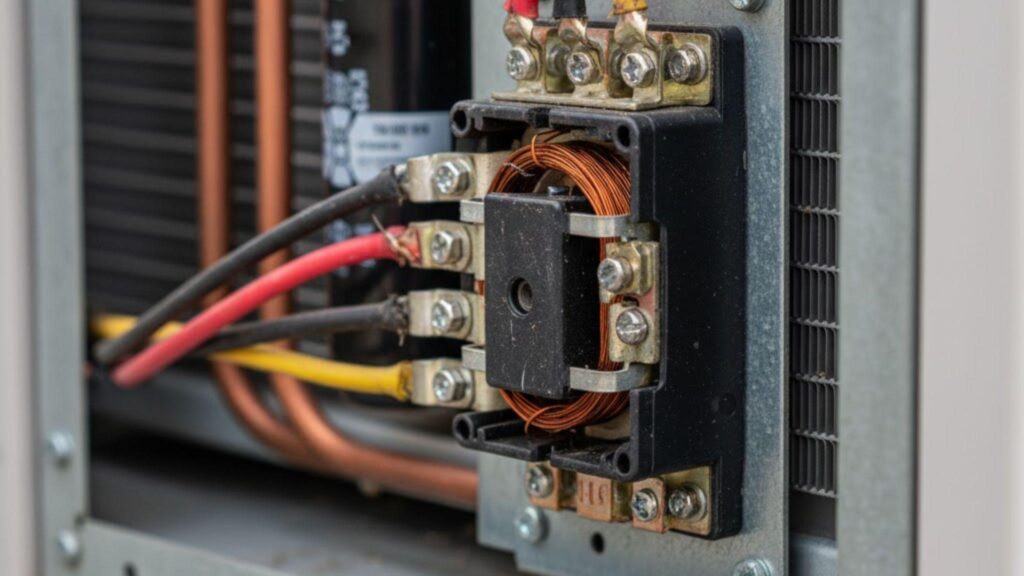One of the clearest bad AC contactor signs is when the air conditioner fails to start despite the thermostat being set correctly. A humming or chattering sound from the outdoor unit often indicates that the contactor is struggling to engage. Burnt or melted plastic around the contactor is another red flag, as it suggests overheating and electrical arcing. These symptoms not only affect cooling performance but also pose safety risks if left unaddressed.
Another sign is inconsistent cooling cycles. If the system turns on and off rapidly, the contactor may be sticking or failing to close properly. This short cycling can strain the compressor and reduce the overall lifespan of the HVAC system. At this stage, professional inspection is strongly recommended.
How to test an AC contactor safely?
For those wondering how to test AC contactor components, it’s important to proceed with caution. Since contactors handle high-voltage electricity, testing should only be done with proper tools and safety knowledge. A multimeter can be used to check for continuity across the contactor terminals. If the coil is energized but the contacts do not close, the contactor is faulty. Similarly, if there is no continuity when the coil is powered, replacement is necessary. While some homeowners attempt this test themselves, it is generally safer to rely on certified HVAC technicians.
Can AC contactor repair extend system life?
Yes, timely AC contactor repair can restore proper function and prevent further damage to the compressor and condenser fan motor. In many cases, replacing a faulty contactor is more cost-effective than repairing it, as new contactors are relatively inexpensive compared to the potential cost of compressor replacement. Regular maintenance, including inspection of electrical components, helps identify early signs of wear and ensures the system operates efficiently.
For residents seeking professional help, AC Repair services in Bonita Springs, FL, are available to handle these issues promptly and effectively. Skilled technicians can diagnose whether the contactor needs cleaning, repair, or full replacement.
Why does an AC contactor fail?
Several factors contribute to contactor failure. Over time, repeated electrical arcing causes the contacts to pit and wear down. Exposure to dirt, dust, and insects can also interfere with the contactor’s ability to open and close properly. In coastal regions, salt air corrosion accelerates deterioration. Electrical surges, often caused by lightning or power fluctuations, may burn out the contactor coil. Preventive maintenance, including cleaning and inspection, is the best defense against these issues.
How does a faulty contactor affect cooling performance?
When the contactor fails, the compressor and condenser fan may not receive the necessary power to operate. This results in warm air blowing from the vents, even when the thermostat is set to cooling mode. In some cases, the system may run continuously, driving up energy consumption without delivering comfort. These performance issues highlight why recognizing AC contactor failure symptoms early is so important.
Homeowners who notice these problems should consider scheduling Air Conditioning services in Bonita Springs to restore system efficiency and prevent further damage.
Preventive measures to avoid AC contactor failure
Routine HVAC maintenance is the most effective way to prevent contactor issues. Technicians typically inspect the contactor during seasonal tune-ups, checking for pitting, corrosion, or overheating. Keeping the outdoor unit clean and free of debris also reduces the risk of insects or dirt interfering with the contactor. Installing surge protectors can safeguard against electrical spikes that damage the coil. By addressing these preventive measures, homeowners can extend the life of their air conditioning systems.
FAQs About AC Contactor Failure
1. What happens if I ignore AC contactor failure symptoms?
Ignoring the signs can lead to compressor damage, higher energy bills, and complete system breakdown. Since the compressor is one of the most expensive components, early intervention is crucial.
2. Can I replace an AC contactor myself?
While some DIY enthusiasts attempt it, replacing a contactor involves working with high-voltage electricity. For safety and warranty protection, it’s best to hire a licensed HVAC technician.
3. How long does an AC contactor last?
On average, a contactor lasts between 5 to 10 years, depending on usage, environmental conditions, and maintenance frequency.
4. Is a buzzing noise always a sign of a bad contactor?
Not always. Buzzing can also indicate loose wiring or a failing capacitor. However, it is one of the most common bad AC contactor signs and should be inspected promptly.
5. How much does an AC contactor repair or replacement cost?
The cost varies depending on the system and region, but replacement is generally affordable compared to major component repairs. Professional services ensure the job is done safely and correctly.
Conclusion
Recognizing AC contactor failure symptoms is essential for maintaining a reliable and efficient cooling system. From buzzing noises and burnt contacts to inconsistent cooling cycles, these warning signs should never be ignored.
Testing and repairing or replacing the contactor promptly can prevent costly damage to the compressor and extend the life of the HVAC unit. For homeowners in Southwest Florida, Dr. Kool Air Conditioning & Refrigeration provides expert diagnosis, repair, and replacement services to keep air conditioners running smoothly year-round.

